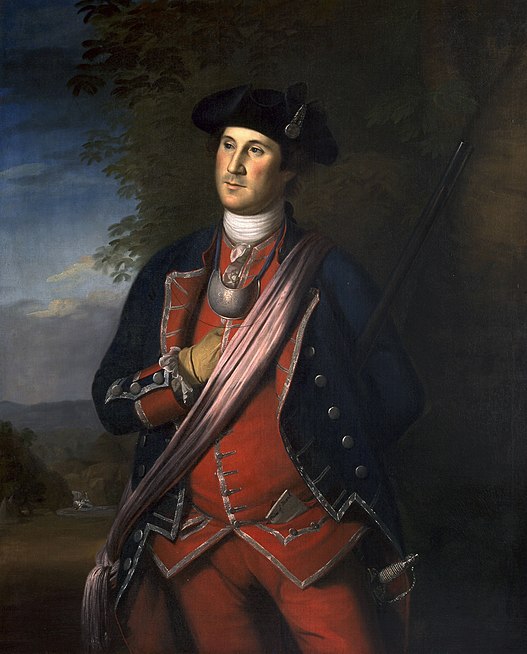Mr. President, I am a soldier and believe in being prepared. For that and other reasons, I will give my vote for the resolutions of the gentleman from Hanover. Rather than submit to the present condition of things, I will raise one thousand men, subsist them at my own expense, and march myself at their head to the relief of Boston.– George Washington
This is a cool quote from American history that you don’t hear much about. Obviously Washington did not have to raise an army in this fashion, but it is interesting that he put it out there. That he was willing to finance such an army if no one else was going to act.
What is also interesting is that George Washington was very familiar with concept of privatized warfare from his experience fighting with the Royal American Mercenary Regiment (RAMR) during the French and Indian War. He was also a champion of actually paying soldiers as opposed to asking them to do what they did, purely out of love of country. Washington found out that with a volunteer militia, it’s a little hard to keep guys focused when they can’t be home to make money or grow food to support their family. Paying a salary kept their heads in the game, and helped reduce attrition.
The other area of privatized warfare that Washington was involved with was privateering. He actually owned stock in privateering ventures and was a supporter of issuing the Letter of Marque to privateers to fight wars.
The artwork posted below is also interesting. That would be the uniform he wore during the French and Indian War. I noted in the past that this war was significant because this is where Washington learned how to fight and lead men in combat. He learned from the various mercenaries that came to fight in the RAMR, and he used that knowledge and experience and applied it later on. –Matt

Charles Willson Peale is the Artist. This is the earliest authenticated portrait of George Washington and shows him wearing his colonel’s uniform of the Virginia Regiment from the French and Indian War. The portrait was painted about 12 years after Washington’s service in that war, and several years before he would reenter military service in the American Revolution. 1772
“I have but one lamp by which my feet are guided; and that is the lamp of experience.”
As the British army tightened the noose around Boston, the Virginia Assembly met in an extralegal session to discuss what steps to take in the wake of what was happening up North. The British hoped that by isolating Boston, they could stamp out the revolution. As the speech below demonstrates, the effect was the opposite of what the British desired, for Virginians—and other colonists—realized that “If they can do it to Boston, they can do it to us.”
The words of the debate were later written from memory by William Wirt, and though they may not be the exact words spoken by Patrick Henry and others, the general consensus among historians is that they certainly contain the spirit of Henry’s remarks and are consistent with what we know of his eloquence. He was, in many ways, the voice of the American Revolution. Likewise, the authenticity of the remarks by George Washington has been called into question, but again, they probably accurately reflect his feelings. Loyal almost to the last, he was now thoroughly fed up with the British.
The members address the president of the meeting to gain the floor. The President acknowledges each by the jurisdiction which he represents.
Mr. Pendleton: Mr. President.
The President: The gentleman from Caroline.
Mr. Pendleton: I hope this Convention will proceed slowly before rushing the country into war. Is this a moment to disgust our friends in England who are laboring for the repeal of the unjust taxes which afflict us, to extinguish all the conspiring sympathies which are working in our favor, to turn their friendship into hatred, their pity into revenge? Are we ready for war? Where are our stores—where our arms—where our soldiers—where our money, the sinews of war? They are nowhere to be found in sufficient force or abundance to give us reasonable hope of successful resistance. In truth, we are poor and defenseless, and should strike when it becomes absolutely necessary—not before. And yet the gentlemen in favor of this resolution talk of assuming the front of war, of assuming it, too, against a nation one of the most formidable in the world. A nation ready and armed at all points; her navy riding in triumph in every sea; her armies never marching but to certain victory. For God’s sake, Mr. President, let us be patient—let us allow all reasonable delay, and then if the worse comes to the worst, we will have no feelings of blame. There is no man in this Convention more attached to the liberties of this country than is the man who addresses you. But think before we sacrifice perhaps everything to the spirit of indignation and revenge. Think of the strength and lustre which we derive from our connection with Great Britain—the domestic comforts which we have drawn from the same source—the ties of trade and business—the friends and relatives we have in England. The tyrannies from which we suffer are, after all, the tyrannies of a party in temporary possession of power. Give a little time, take no hostile action, and these tyrants will be overthrown in England and men in sympathy with America will assume authority. Our ills will pass away and the sunshine of the halcyon days of old will come back again. We must arm, you say; but gentlemen must remember that blows are apt to follow the arming, and blood will follow blows, and, sir, when this occurs the dogs of war will be loosed, friends will be converted into enemies, and this flourishing country will be swept with a tornado of death and destruction.